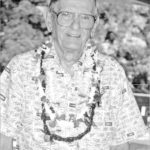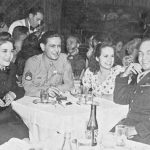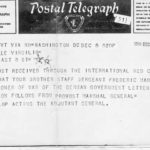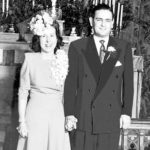‘Betrayed’
Local author pays homage to his father’s World War II experience with narrative
The stories of World War II seem to retreat further into oblivion with each year that passes. Those who fought in the war are in their late 80s and 90s now (if still alive), and many of their children remember the rule, “don’t ask dad or grandpa” about the war. Younger generations are inundated by accounts of ongoing current wars and conflicts. They have little reason or interest in reading about a six-year period from 72 years ago that took place overseas unless their teachers require it.
So the question comes to mind: Does another book about someone’s WWII experience need to be published? Is it still pertinent? After reading retired University of Hawaii Maui College professor Frederic H. Martini’s account of his father’s experience, the answer is a resounding, “YES!”
In the true story, “Betrayed,” Martini details alarming parallels between the atrocities his dad lived through as a prisoner of war and the way he was treated by the U.S. Veteran’s Administration upon his return, and a seemingly unrelated celebration of the immigration to America of unapologetic Nazi Wernher von Braun. Von Braun is considered to be the father of the U.S. rocket program — the precursor to the National Aeronautics and Space Administration — along with a group of German scientists who immigrated along with von Braun, in a discrete program called Project Paperclip.
In this well-paced and engaging book, Martini explains that after his father died in 1995, his mother, Betty, showed him a trove of memorabilia from his father’s time in the war. Soon, too, documents pertaining to the war were being declassified by the U.S. government, and Martini decided to start looking into his father’s story and his rejected VA claims for recognition as a prisoner of war, as well as for compensation and health coverage — a situation which plagued Fred and Betty for the rest of their lives.
“Over the years, he did tell me about their arrival in Buchenwald, about the crematorium basement, about his appendicitis and about the injections in his heart,” explained Martini. “And, of course, I saw his reaction when he saw von Braun on television. It was following that link that led me to the idea of paralleling the stories of the two men.”
Martini uncovered not just the horrors inflicted on Fred at the hands of the German army, but also the treatment by the U.S. government in the aftermath.
The book opens with Staff Sergeant Fred Martini being awakened at 2:30 a.m. by “a sharp tap on the forehead and a bright flashlight in the eyes. The flashlight held by Major Vincent Masters, who told Fred to be on the truck in 30 minutes.” Fred served as left waist gunner and assistant flight engineer for the B-17 bomber he was assigned to.
Brief descriptions of the remainder of the crew follow, before returning to summarily describe Fred’s youth and descriptions of early missions of the Jackson crew in the 551st Squadron.
Martini’s depiction of the air battle, which ended with Fred’s parachute evacuation from the plane, is as exciting a read as watching any action movie.
Before taking the narrative further into Fred’s experience, Martini introduces the reader to Baron Wernher Magnus Maximillian von Braun, who, at age 32, depicted Hitler’s Aryan perfection — tall, blond, blue-eyed and very fit. He had a commanding presence and arrogance which stemmed from his father being a Prussian aristocrat, as well as from the result of his rapid ascent through German academic, political and scientific ranks.
In subsequent chapters that deal with von Braun, it is clear he was very charismatic and enjoyed being the center of attention. It also becomes evident to the reader that he was an extremely manipulative, self-centered man who believed himself to be “the smartest guy in the room” not unlike other upper levels of the Third Reich, as Martini explains. Von Braun knew how to play the system to benefit and promote himself.
During Martini’s depiction of the Allied POWs, he doesn’t balk at describing the tortures his father and others experienced. Soldiers who were captured were supposed to be held in a prisoner of war camp. Unluckily for Fred, he fell into Gestapo hands and found himself sent not to a POW camp, but unexplicably to Buchenwald concentration camp where he was held, along with 167 other Allied airmen, for 61 days.
Somehow, Fred survived Buchenwald: he survived a ruptured appendix while there, rampant dysentery, brutal beatings, starvation, hard labor and forced marches. He even survived despite being marked “DIKAL,” which meant he was marked to never leave the camp unless through the crematorium smokestacks. He survived to see the concentration camps and POW camps liberated by the Allies.
Upon returning home to Brooklyn, Fred moved in with his best friend, Eddie Virgilio (who would become his brother-in-law), and his wife, Lucille, and sons, and before long, he began dating and subsequently marrying Lucille’s sister Betty.
Fred settled in to civilian life quickly, but began experiencing health issues, which he believed stemmed from his time at Buchenwald. While trying to obtain coverage for mounting medical costs, his requests to the VA and the War Claims Commision were denied. He learned he was not alone. Those agencies refused to accept Fred and the other airmen’s accounts that they were held at Buchenwald. This refusal affected Fred’s monthly benefits as well as treatment for health issues which were directly related to his imprisonment.
During this same time, LtC. Holger Toftoy, commander of the Army Ordnance Department, was promoting work with von Braun on “Project Paperclip” during which time von Braun was feted as a hero. Toftoy worked hard to keep secret the fact that von Braun never renounced his Nazi ties, never admitted to links to any atrocities.
While Fred and the other airmen were fighting to be recognized as POWs, von Braun was meeting with Walt Disney and President John F. Kennedy, and being venerated for his work on the U.S. rocket program.
It is true that von Braun had little effect on what happened to Fred during the war. What links these men’s stories is the disparate way both were treated after the war. A U.S. serviceman had his experiences questioned by the VA, and was treated as though he were delusional. On the other hand, a non-repentant Nazi was lauded with praise, while his backstory was kept hidden by certain military and government officials.
“I’d like to see the Congressional Resolution passed correcting the official record and acknowledging what the Buchenwald airmen went through,” noted Martini. “They were neither lying nor delusional when they reported their experiences.
“Second, I’d like to see the official NASA and Marshall Space Center histories and bios of Wernher von Braun corrected, as right now almost nothing in the summaries is accurate other than his name.”
Fred never had his situation resolved. Until the day he died, he was frustrated and mystified as to why he was being treated as a liar, but he didn’t let that discourage him, and he kept trying to get things corrected. According to Martini, Fred remained very patriotic and was commander of his local VFW chapter.
World War II may be far in the past, but lessons can still be learned from the experiences of these U.S. servicemen. It is fortunate people like Martini are willing to do the research (seven years for this book) to keep it fresh in our minds.
“Betrayed: Secrecy, Lies and Consequences” is available at www.amazon.com.
* Catherine Kenar can be reached at ckenar@mauinews.com.
- Retired UH-MC professor and author Frederic (Ric) H. Martini and Bonnie. — Photo courtesy Frederic H. Martini
- Frederic (Fred) C. Martini visiting Maui — Photo courtesy Frederic H. Martini
- Fred’s sister, Liz, (from left), Fred, Alice Jackson and Loren Jackson in New York City, late June 1945 — Photo courtesy Frederic H. Martini
- The telegraph Fred’s family received telling them he was alive and liberated. — Photo courtesy Frederic H. Martini
- Betty and Fred on their wedding day, Dec. 28, 1946 — Photo courtesy Frederic H. Martini







